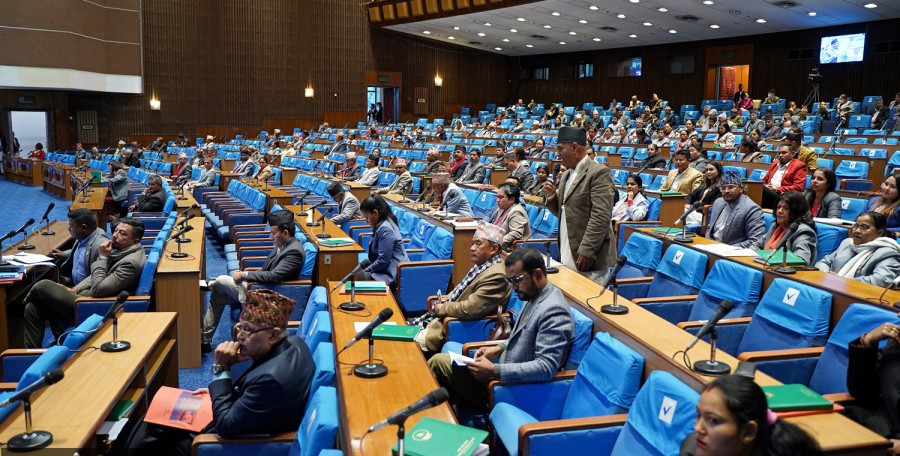Columns
The origins of law in Nepal
A run through the law-making process from conceptualisation to implementation.
Khim Lal Devkota
In Nepal, the law originates within the executive entity and culminates with parliamentary approval and presidential authentication. The implementation cycle begins after the authentication. Within the executive branch, approximately a dozen intricate steps are traversed, beginning with the conceptualisation of a bill to the preparation of the bill for parliamentary submission.
Upon entry into Parliament, the bill undergoes about two dozen steps, navigating the complex landscape of legislative processes to transform it into law. After this rigorous parliamentary journey, the President authenticates the bill, readying it for implementation.
The Constitution of Nepal, 2015 provides policy and legal guidance on law-originating processes. Nepal's Parliament, like in other countries, has an important role in this process. Procedurally, Nepal's legislative process can be divided into three phases: Pre-legislative, legislative and post-legislative.
Pre-legislative phase
This process includes policy identification, subject analysis, drafting, scrutiny and other elements. As outlined in the Government of Nepal (Allocation of Business) Rules, when contemplating the amendment of existing laws or the creation of new legislation, the relevant ministry is required to seek the input of the Ministry of Law, Justice and Parliamentary Affairs. This process entails indicating the necessity for enacting the law and specifying the elements to be encompassed within the proposed legislation. Similarly, if the matter to be included in such a law falls within the jurisdiction of other ministries, the opinion of such ministries should also be sought. After receiving the opinion and consultation, the concerned ministry should submit the bill to the Office of the Prime Minister and Council of Ministers (OPMCM) for policy approval.
If the bill also includes financial matters, the consent of the Ministry of Finance is required. Similarly, the consent of the Public Service Commission should be sought in case of legal arrangements regarding the conditions of civil service. The consent of the Public Service Commission should be sought based on the decision of the OPMCM. Before deciding on presenting the bill in the Federal Parliament, the OPMCM can send it to the Bill Committee of the OPMCM for discussion or to decide on its own. After the bill is principally approved by the OPMCM, there is an arrangement for the concerned minister to send the bill to Parliament for registration. The bill thus received is registered with the Federal Parliament Secretariat.
Most of the bills are introduced by the executive body (these are also known as “government bills”). These bills should be introduced in Parliament by the respective ministers. Apart from ministers, members of the Federal Parliament can also introduce bills. Such bills are called “private bills.” The framework and process of law-making should be followed even when introducing a private bill.
Legislative and post-legislative phases
The legislative phase, outlined in Part 9 of the constitution, encompasses bill introduction, approval, withdrawal, authentication and related procedures. The Rules of the House of Representatives (HoRs), 2023, and the Rules of the National Assembly (NA), 2018, comprehensively outline this phase, aligning with constitutional provisions.
According to the constitution, a bill may be introduced in either the HoRs or the NA, except for finance bills, which exclusively originate in the HoRs. Additionally, bills concerning security bodies like the Nepal Army, the Nepal Police, and the Armed Police Force are exclusively introduced as government bills.
Members wishing to present bills must provide comprehensive details, including the purpose, financial aspects, explanations and delegated legislation. Government bills necessitate a five-day notice before submission, while private bills require a seven-day notice to the Parliament secretariat. The five-day advance notice rule does not apply to matters concerning the budget or the bills associated with it.
After registration, government bills are distributed to members within two days, while private bills are circulated within four days. The bill can be presented for discussion in any meeting after seven days of registration (five days for government bills). Members intending to express dissent must register one day before the proposal is tabled in the HoRs or within five days of bill distribution in the NA. After the bill is submitted to the House, the proposing member (Minister) may propose publicising the bill for general public feedback.
A provision allows for a 72-hour window after conceptual discussions for members to propose amendments and subsequent detailed discussions can occur within the House. The conceptual discussion also takes place in the parliamentary committees. In the NA, bills are discussed in the Legislative Committee, while the HoRs holds discussions in various sectoral thematic committees.
After thorough committee deliberations, the bill returns to the House for further consideration and must garner majority support. Bills passed by one House proceed to the other for deliberation, following procedures similar to the initial introduction process.
Bills forwarded from the HoRs to the NA, particularly the Finance Bill, are expected to be returned within 15 days. Other bills should receive a response from the NA within 60 days. However, specific timeframes for bills originating in the NA and sent to the HoRs have not been stipulated.
Bills facing disagreements between the Houses can be referred to a joint committee. However, this scenario has not yet materialised. The composition of the Joint Committee stands at a ratio of 1:5 between the NA and the HoRs. Under this arrangement, the HoRs holds significant sway, leading to a relatively diminished role for the NA.
When the President grants assent to authenticated bills, the information is communicated to both the HORs and the NA and published in the Nepal Gazette, becoming effective from the specified enactment date.
Constitutionally, ordinances may be issued by the President on the OPMCM's recommendation during non-session periods. Each ordinance requires subsequent introduction in both Houses, becoming inactive if not accepted. Ordinances approved by both Houses instigate the parliamentary lawmaking process through a replacement bill.
The post-legislative phase takes place after bills are authenticated by the President. It primarily involves conducting parliamentary studies, extensive research, and vigilant monitoring of parent acts and delegated legislation. In Nepal, this phase can be predominantly analysed through two lenses: Post-legislative scrutiny and delegated legislative management.
After a bill is introduced in Parliament, its discussion and approval procedures are outlined in the relevant rules of the HoRs and the NA. However, there is currently no clear policy or legal framework before submission or after approval from Parliament.
A bill titled 'Legislative Law 2023', addressing drafting and implementation procedures, has been officially registered with Parliament. The aim is to ensure consistency in lawmaking, maintain a systematic record of enacted laws, define the boundaries of delegated legislation, and enhance transparency.
During my tenure in the Delegated Legislation Committee of the NA, Chairperson Ramnarayan Bidari, Member Radheshyam Adhikary, and I repeatedly requested the government, and the committee formally instructed them to draft this law, a fact also reflected in the background of this bill.
The government often approves numerous bills from the OPMCM and registers them in Parliament without adequate consultation with stakeholders. Regarding the Education Bill, the Prime Minister initially stated that the approved bill from the OPMCM was in duplicate version. It has been reported that the Civil Service Bill was approved by the OPMCM on September 7, 2023, but the government has not made it publicly available. The process of drafting the bill appears opaque.
I would argue that numerous bills have been crafted to serve the interests of specific groups. To tackle this issue, among others, the Legislative Bill has been registered in Parliament. According to its provisions, any bill must undergo discussions with stakeholders, the concerned ministry should publicly release the draft on its website for 30 days, and delegated legislation won't gain legal validity until published in the Nepal Gazette.
Nepal's legislative journey, from executive origin to presidential authentication, faces transparency challenges, which will be addressed by the Legislative Bill 2023, emphasising stakeholder engagement and improvements in bill transparency.




 18.12°C Kathmandu
18.12°C Kathmandu















